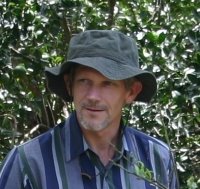There are several options for getting around in Uganda. The most common, by reason of economics, is what is sometimes called in Africa "route 11" -- one's own two feet. For the more prosperous (or less thrifty), however, other choices abound.
Most basic is the simple
boda-boda (bicycle taxi), easily identified by a bright-colored cushion on the carrier rack mounted over the rear wheel (if you've ever ridden cushionless on this metal carrier on a rough road, this is greatly appreciated). Men ride astraddle, with each foot resting on a short piece of iron rebar welded to on each side of the rear axle. Women, typically, ride side-saddle (there's not much choice with a skirt on!). You can get a
boda-boda ride from our neighborhood into town for the equivalent of $0.20 in U.S. currency.


The next step up is the motorcycle taxi (still referred to as a
boda-boda, perhaps with the addition of the Swahili word
pikipiki -- "motorcycle"). When considering climbing on the back of a
pikipiki in Uganda, it is wise to note that there is considerably more risk of bodily harm if you are dodging through traffic in the capital, for example, than if you are meandering along a village path.

For those who prefer to be inside a vehicle and don't mind close--
very close--companionship with fellow earthlings, there's the standard Toyota Hiace taxi, usually white with the government-mandated blue hatch pattern running horizontally around the body. Most of these are rated for 14 passengers, but, especially on rural routes, passengers configure themselves creatively to accommodate numbers up into the 20s. These taxis are locally called
kamunyes, named for the yellow-billed kite, a scavenging bird that swoops down to pick up bits of food from the ground. The mechanical
kamunye does the same with people--stopping frequently to pick people up from the side of the road.
Kamunyes carry all manner of things besides humanity, including bunches of bananas, furniture, bicycles, mattresses, poultry and goats.


View of the "Old Taxi Park" in Kampala, where you can get rides to points east of the capital
Somewhat more comfortable, and statistically safer, are the big 50-passenger buses. At least one gets a seat to oneself, and most of the non-human cargo tends to ride in the cargo bay under, or on the roof rack over, the bus.

In areas where taxis are scarce, it is often possible to wave down a truck and climb on top of whatever else it's carrying and get from point A to point B, for a nominal fee. This can be more or less hazardous, of course, according to the nature of the existing cargo...one should think twice before perching atop the metal framework over the bed of a truck carrying a load of long-horned
Ankole cows! I've often seen this done, and wondered how many puncture wounds have been sustained when a rider's balance failed on a rough road.

Beyond these means of transportation, some of us are blessed to have sufficient resources either to hire a vehicle as needed or even to purchase one for work-related and private purposes. In Uganda this is an expensive luxury, by the time one pays high fuel, maintenance, and tax rates.
As one goes about getting around in East Africa, there are encounters with quite a variety of traffic-types and road-side scenery. In Kampala, traffic gridlock is a frequent annoyance.

In the rural areas, one is more likely to get slowed down by a herd of cows in the road way.

A common sight all across the country are miniature fruit and vegetable markets along the sides of the road.

The dark side of transportation in East Africa is that these roads can be among the most dangerous in the world. Many roads are chronically full of potholes or too narrow for the traffic they have to carry. Compounding the risks are drivers of marginal or impaired competence, whether because of poor training, lack of experience, or inebriation. Poorly maintained vehicles frequently suffer tire blow-outs, brake-failure, or suspension/steering problems.
Our missionary community in Uganda is right now grieving the death, just a few days ago, of Adam Langford, a colleague from the Jinja mission team, who died in a vehicle accident. This kind of thing reminds us that travel on these roads does mean taking one's life in one's hands...or maybe better, putting one's life in God's hands. We appreciate those who keep us in prayer as we drive, or ride, on the roads of Africa.


















